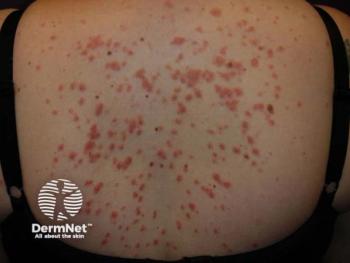
Researchers weigh value of IL-23 over IL-12/23 in psoriasis
Key Takeaways
- Risankizumab targets IL-23 alone, showing superior efficacy over ustekinumab and placebo in psoriasis trials, achieving higher PASI 90 and sPGA scores.
- The trials demonstrated risankizumab's continued efficacy with quarterly dosing, achieving PASI 90 in 82-85% of patients by week 52.
The superiority of risankizumab over ustekinumab and placebo in two phase three psoriasis trials supports the value of targeting interleukin (IL)-23 alone over IL-12 and IL-23, according to study authors. The publication appeared online in the August issue of The Lancet.
The superiority of risankizumab over ustekinumab and placebo in two phase three psoriasis trials supports the value of targeting interleukin (IL)-23 alone over IL-12 and IL-23, according to study authors. The publication appeared online in the August issue of The Lancet.
Ustekinumab targets IL-12 and IL-23, while risankizumab targets only the p19 subunit of IL-23. In UltIMM-1 and UltIMM-2, investigators randomized 506 patients and 491 patients, respectively, to receive risankizumab (150 mg), ustekinumab (45 or 90 mg, depending on patient weight) or placebo.
During an initial 16-week treatment period, patients received subcutaneous drug or placebo injections at weeks zero and four. At week 16, patients initially assigned to placebo switched to 150 mg risankizumab, while other patients continued their original regimens, through week 52. After week 16, patients underwent injections every 12 weeks. Investigators assessed efficacy outcomes monthly during the initial 16 weeks, then every six weeks thereafter.
A total of 937 patients completed the study. At week 16, the proportions of UltIMM-1 and UltIMM-2patients who achieved Psoriasis Area and Severity Index (PASI) 90 were 75.3 percent and 74.8 percent, respectively. The corresponding figures for ustekinumab were 42.0 percent and 47.5 percent, and, for placebo, 4.9 percent and 2.0 percent (p<0.0001, risankizumab versus ustekinumab and placebo).
The proportions of risankizumab-treated patients who reached static Physician's Global Assessment (sPGA) scores of zero or one at week 16 in UltIMM-1 and UltIMM-2 were 87.8 percent and 83.7 percent. The corresponding figures for ustekinumab and placebo were 63.0 percent/61.6 percent and 7.8 percent/5.1 percent (p<0.0001, all analyses).
Also at week 16, 35.9 percent of risankizumab-treated patients in UltIMM-1 and 50.7 percent in UltIMM-2 reached PASI 100. Meanwhile, 36.8 percent and 51.0 percent of patients, respectively, reached sPGA zero. Week 16 PASI 100 rates for ustekinumab were 12.0 percent and 24.2 percent, respectively, while 14.0 percent and 25.3 percent of ustekinumab-treated patients reached sPGA zero at this time point.
The studies are important because of the high level of PASI response achieved by risankizumab, said co-author Mark Lebwohl, M.D., of Icahn School of Medicine at Mount Sinai in New York. "In both studies, we're looking at 75 percent of patients achieving PASI 90, which is extraordinary. With four treatments a year, after loading doses, we are getting PASI 90 in three-quarters of patients."
Risankizumab appears to provide continued efficacy with 12-week dosing, he said. And the degree of efficacy the drug achieved makes it one of the most impressive drugs studied for psoriasis to date, particularly among drugs injected every three months, Dr. Lebwohl added. At week 52, 82 percent and 85 percent of UltIMM-1 and UltIMM-2 patients treated continuously with risankizumab achieved PASI 90, as did 78 percent and 81 percent of placebo patients, respectively, who switched to risankizumab at week 16.
"The frequency of any adverse events was no higher than in the placebo or ustekinumab groups," he added. At week 16 in UltIMM-1, risankizumab was associated with fewer serious adverse events (SAEs, 2.3 percent) than ustekinumab (8.0 percent) or placebo (2.9 percent). In UltIMM-2, risankizumab's SAE rate was 2.0 percent, versus 3.0 percent for ustekinumab and 1.0 percent for placebo.
Rates of specific SAEs were similar between all treatment groups through week 52. Two major adverse cardiovascular events (MACE) occurred in the risankizumab cohort of UltIMM-2, versus zero MACE in all other treatment groups, including both studies. However, both patients who experienced these events had several cardiovascular risk factors, and investigators did not consider the events to be risankizumab-related.
"We're looking at a very well-tolerated medication, with no worrisome signals," said Dr. Lebwohl.
The studies had few limitations, he added. As is typical of trials in moderate-to-severe plaque psoriasis, patients were predominantly white males. And because the study design precluded comparison against placebo outcomes out to one year, study authors wrote, further studies are needed to evaluate longer-term outcomes. Study strengths include the use of an active comparator - particularly one with the same dosing schedule as risankizumab, Dr. Lebwohl said.
Once approved, risankizumab will provide dermatologists with a highly effective weapon against psoriasis, he said. "We don't have a cure. But when you get down to an injection that you can give as infrequently as four times a year, and it keeps the skin close to normal, that goes a long way toward meeting patient needs." The drug will allow patients to live a nearly normal life - without frequent self-injections or pills that cause many side effects, he said.
DISCLOSURES
Dr. Lebwohl has received research grants from AbbVie, Amgen, Boehringer Ingelheim, Celgene, Eli Lilly, Janssen, Kadmon, Leo Pharma, Novartis, Pfizer, and Vidac. He has also been a consultant (honoraria) for Allergan, Aqua Pharmaceuticals, Boehringer Ingelheim, Leo Pharma, Menlo and Promius.
REFERENCE
Kenneth B Gordon MD, Bruce Strober MD PhD, Mark Lebwohl MD, et al. "Efficacy and Safety of Risankizumab in Moderate-to-Severe Plaque Psoriasis (UltIMM-1 and UltIMM-2): Results from Two Double-Blind, Randomised, Placebo-Controlled and Ustekinumab-Controlled Phase 3 Trials," The Lancet. August 2018.
Newsletter
Like what you’re reading? Subscribe to Dermatology Times for weekly updates on therapies, innovations, and real-world practice tips.










